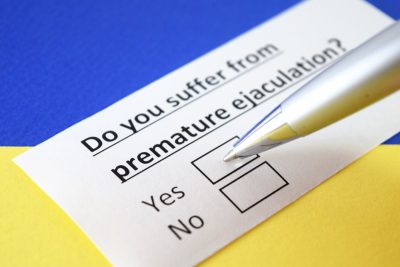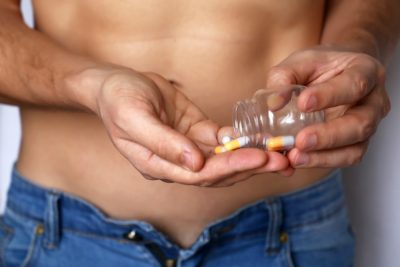Premature ejaculation (PE) refers to when men engaging in sexual intercourse ejaculate sooner their partners wish during sexual intercourse.
Fortunately, there are quite a number of treatment options for premature ejaculation, ranging from performing exercises, using certain products, or getting prescription medication specifically for PE.
One of the most frustrating and downright embarrassing sexual health issues most men are hung up about is that of premature ejaculation. Premature ejaculation is not very pleasant for both partners.
Thing is, many men experience PE on a regular basis. Premature ejaculation, according to the Cleveland Clinic, is the #1 most common sexual health issue that most men under the age of 40 encounter.
With constant practice, it becomes generally easier to control yourself and pace yourself accordingly, which increases the time between arousal and ejaculation so that you and your partner get more satisfaction out of sexual intercourse.
Fast facts about premature ejaculation
Here are some fast facts about premature ejaculation:
- Premature ejaculation (PE) is a sexual dysfunction wherein a man ejaculates sooner than either he or his partner desires.
- Premature ejaculation can be chronic or acquired.
- This is a common disease affecting almost a third of all men globally.
- Exercises, products, supplements, and medications are available for men who seek treatment for premature ejaculation.
Some men have been suffered from PE for many years. What if your PE problems are chronic and persistent?
What if you are among the many men who desire vigorous, long-lasting sexual intercourse owing to the ability to postpone ejaculation and last longer in bed (regardless if you experience PE or not)?
Let’s take look at the causes of premature ejaculation as well as several ways to prevent it.
Causes of premature ejaculation
 Premature ejaculation also goes by similar terms such as early ejaculation, rapid ejaculation, or premature climax. It’s a male sexual health condition wherein ejaculation occurs sooner than men or their partners want.
Premature ejaculation also goes by similar terms such as early ejaculation, rapid ejaculation, or premature climax. It’s a male sexual health condition wherein ejaculation occurs sooner than men or their partners want.
That said, the question still remains: How premature is “too premature”? Scientists have long grappled with that question for some time now. The first time premature ejaculation came into the medical record was back in 1887.
A few years ago, the International Society for Sexual Medicine defined premature ejaculation as the following:
- Ejaculation, which always or almost always occurs before or within about 1 minute after penetration into the vagina, starting from the first sexual experience
- Reducing the delay time of ejaculation, usually up to 3 minutes, sometimes less
- Inability to delay ejaculation for all or almost all vaginal penetrations
- Premature ejaculation is also often associated with negative personal consequences, such as distress, anxiety, frustration, or avoidance of intimacy.
However, this definition does not apply universally to all men, including those who are not involved in vaginal sex. A more general and probably more appropriate definition would be to condense it down to the following things:
- Complete loss of control over ejaculation
- Slight ejaculatory latency
- Emotional stress shared between patient and partner
And this is quite often: premature ejaculation affects about a third of the male population, which makes it the most common sexual dysfunction in men.
Scientists believe this is caused by a hypersensitive neurological connection between the penis and the brain. When the penis begins to feel pleasure, the brain responds quickly and ejaculation occurs. Unfortunately, not all men are able to control this reaction.
How long should it take to ejaculate?
The most optimal answer to this question is as much as you and your partner want. Each person has his or her own sexual preferences, and the desired duration of sex is very individual.
But it is important to be able to manage your capabilities. On the other hand, few can restrain ejaculation for several hours, any statements on this subject may not correspond to reality.
In one study, in which about 600 couples took part, the duration of sexual intercourse from the moment of penetration was detected.
The result varied from 30 seconds to 45 minutes with an average value of 5.3 minutes. According to other studies, a large half of respondents, regardless of gender, said they want sexual intercourse to last from 6 to 14 minutes on average.
As you can see, the main thing is that sexual intercourse lasts so long that it would be able to satisfy both partners. If you ejaculate too quickly to satisfy your or your partner’s sexual desires, then that’s basically premature ejaculation for you.
Fortunately, there are some steps you can take to address this problem.
How to prevent premature ejaculation?
To date, there are several treatment options for PE. These can be exercises that you can perform on your own or with a partner, special food, or medications.
Retention method
This is a common and effective therapy for PE. Begin sexual activity as usual until you feel almost ready for ejaculation. Then let your partner squeeze the end of your penis in the head area. Hold it for a few seconds, wait until there is an urge to retreat.
You can do this several times in one session. In the end, make sure that you had an orgasm: since you retrain your body to have sex in a new, more enjoyable way, you need to regularly go through the whole process from and to.
Kegel exercises (Pelvic floor exercises)
If your pelvic floor muscles are not in good shape, they may impair your ability to delay ejaculation. Special exercises can help you strengthen these muscles. To feel the pelvic floor muscles, stop urinating in the middle of the process.
To tone your pelvic floor muscles, tighten them, hold the contractions for a few seconds, then relax for a few seconds. Perform 5 sets of 12 repetitions per day.
Stop-and-Go (Edging) method
Like the retention technique, you can also practice this method with a partner or masturbate. When you masturbate and feel that ejaculation is about to come, stop and pause until the desire to ejaculate has quieted. Then continue the process.
You can do this as many times as you want in one session. Over time, you will learn to recognize when approaching the desired point. Such exercises should be repeated regularly to achieve the effect.
Use of special condoms or creams to numb sensations
Inside special condoms, there is some pain medication. This is usually a safe substance, such as lidocaine or prilocaine. It reduces the sensations that can prolong your sexual intercourse.
Anesthetic creams are sold for a similar purpose. If you use them, use a condom. This will prevent the penetration of the cream into the vagina.
Premature ejaculation wipes
Certain manufacturers distribute over-the-counter towelettes that are disposable. These are applied to the penis before sexual activity to reduce sensation, in turn helping you go longer.
The substance that reduces sensations is formulated to prevent overstimulation without totally numbing the penis altogether.
Medication
 Some medicines have been found to be effective in preventing or at least slowing down premature ejaculation. However, they should be discussed with your doctor.
Some medicines have been found to be effective in preventing or at least slowing down premature ejaculation. However, they should be discussed with your doctor.
Silodosin, the most commonly prescribed medication for treating an enlarged prostate, has been linked to the prevention of PE in some studies. However, you should not take it without consulting a doctor.
As for the use of medications such as sildenafil or tadalafil, they make it easier to get pleasure and prolong the duration of your erection.
Many medications used to prevent PE act by suppressing too much of the hormone responsible for pleasure. Thus, it is possible to slightly delay the ejaculation.
What causes PE?
As earlier discussed, premature ejaculation might be something that genetics determine, or something that is otherwise acquired.
Bottom line is, when you start engaging in sexual intercourse, it can be a little awkward dealing with the presence of a partner when you’re completely naked and erect.
It is likely that your previous sexual experience consists solely of masturbation, and oftentimes, the goal during masturbation is to come as quickly as you possibly can.
While masturbation is all well and good, it can lead to complications in your sex life with others. One of the ways to overcome this is to retrain yourself to enjoy prolonged arousal and stimulation, instead of merely ejaculating to fulfill a sexual need. This can be learned through constant practice.
If, however, premature ejaculation is damaging your relationships and persists over time years after your first sexual experience, looking into psychological factors might be the solution.
PE can be caused by mental factors such as anxiety, low self-esteem, depression, relationship problems, or a poor image of your body. In this case, behavioral therapy is certainly an option you can pursue.
There are yet other physical factors that are responsible, including unbalanced hormonal or neurotransmitter levels (testosterone and serotonin come to mind), or other issues such as urethral or prostate inflammation, or outright erectile dysfunction.
Talk to your doctor if you suspect this might be the case and subject yourself to a physical exam.
The good news is that premature ejaculation is well treatable. More than 80 percent of men who visit a doctor complaining of premature ejaculation find an effective solution.
And for most men, it all depends on finding the right course of treatment as well as the right dosage of their chosen solution.








COMMENTS